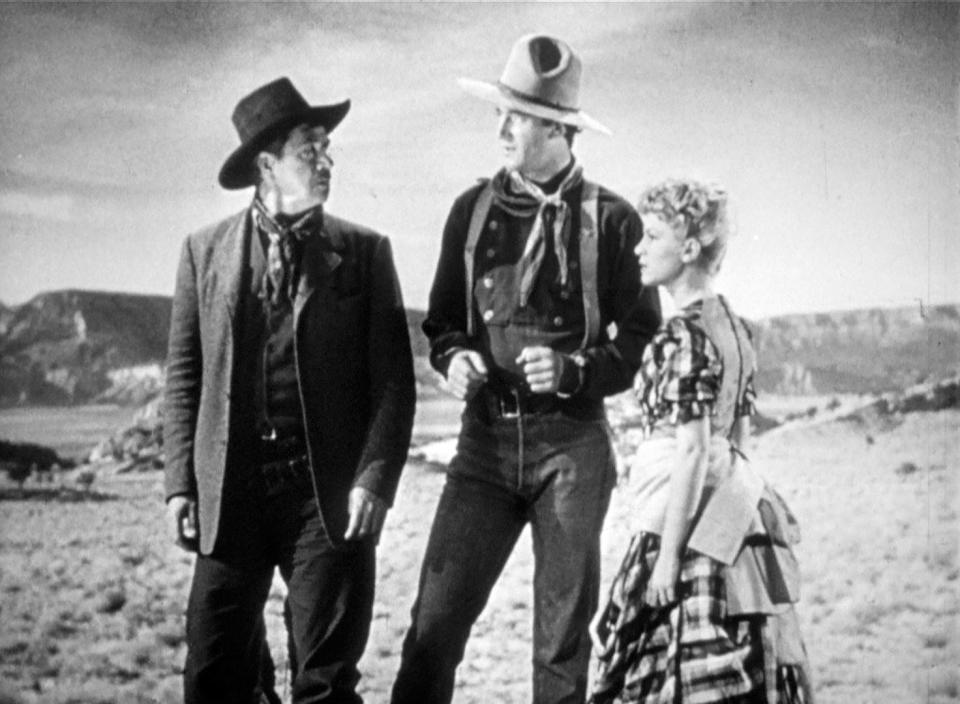Coronavirus is a new enemy, but John Wayne and 1939's 'Stagecoach' show how to beat it
Tens of millions of Americans are hunkered down nationwide, besieged by what President Donald Trump calls an “invisible enemy.” Here’s a suggestion for anyone who’s bored or desperate to escape the 24/7 television coverage of COVID-19. Watch the classic Western, "Stagecoach." The 1939 movie propelled John Wayne to stardom. It won two Oscars and was nominated for five others, including Best Picture and Best Director. The story is more relevant than ever as America does battle with the coronavirus.
Directed by the legendary John Ford, the extraordinary film takes viewers on an exciting journey into the Old West. On one level, it’s a typical Western drama. The plot revolves around a motley group of passengers riding a stagecoach through dangerous territory controlled by the notorious Geronimo. But, on another level, the movie is a fascinating allegory about Americans trying to cope with the Great Depression and European fascism.
The stagecoach travelers comprise a cross-section of American society. Andy Devine plays the good natured, hardworking driver. His initial passengers include a wealthy banker, an effete gambler from a patrician family, and the condescending wife of an Army captain. They’re joined by a tough but fair sheriff; a mild-mannered whiskey salesman with a wife and five kids back home; and a caring but alcoholic doctor. Rounding out the passenger list is a saloon girl/prostitute with a heart of gold.
A dangerous but hopeful journey
John Wayne’s character, the Ringo Kid, makes what might be the grandest entrance in movie history. As a gunshot brings the coach to a sudden stop, the tall, handsome cowboy twirls his rifle with one hand and holds a saddle in the other. His determined look is accented by backlighting, which creates a halo effect around his wide-brimmed hat. This cowboy archangel looks like the personification of America in all its Western glory. Ringo hitches a ride, joining the passengers on their dangerous but hopeful journey.
Gabby Giffords on making it through coronavirus: What I learned fighting for my life. And why it can help America now.
John Ford’s "Stagecoach" became one of the most popular movies of 1939 even through the competition included "Gone With the Wind," "The Wizard of Oz" and "Mr. Smith Goes to Washington." Along with delivering plenty of Western action and thrills, "Stagecoach" struck a responsive chord with moviegoers at a time when America was being threatened by fascism abroad and the Depression at home. If the hostile warriors glaring at the stagecoach from distant hills evoked the European war clouds gathering on America’s horizon, the film’s depiction of the wealthy banker mirrored the era’s social tensions and concerns about corporate greed.

“What’s good for the banks," he insists, "is good for the country.” The banker later declares, “I have a slogan that should be placed on every newspaper in the country – America for Americans! The government must not interfere with business! Reduce taxes!” He adds, “What this country needs is a businessman for president!”
While the movie portrays the upper-class characters as untrustworthy, corrupt, and hypocritical, it glorifies middle-and-working-class passengers. The Ringo Kid, for instance, is a hardworking, moral individual who has fallen on hard times through no fault of his own. Framed for the murder of his father and brother, he seeks revenge against the real killers. “I used to be a good cowhand, but things happen,” he explains. The prostitute replies knowingly, “yeah, that's it. Things happen.”
Outside help needed to survive
If the travelers’ hazardous journey into unknown territory was a metaphor for the Depression, the stagecoach was the vehicle that enabled individuals to work together to reach safety on the other side. Ford’s movie offered hope that all threats could be overcome, whether they came from corrupt businessmen, upper-class snobs, hostile enemies, or impersonal economic and social forces. The film made it clear that Americans could triumph if they remained determined, hardworking, and true to their values, just like pioneers in the Old West.
What to do at home: Your kids can learn a lot playing video games during the coronavirus school shutdown
Although the middle-class and working-class passengers were able to solve most of their problems with little or no help from upper-class individuals, they eventually needed outside help to defeat the greatest threat to their survival. Just when the stagecoach is about to be overrun by Geronimo’s forces, U.S. troops arrive on the scene. The rugged individuals on the stage are saved by government intervention, just like New Deal assistance bailed out average Americans during the Great Depression.
Arguably, today’s enemy — the coronavirus — is far more dangerous than the adversaries faced by the stagecoach passengers in a movie released 81 years ago. Yet the road to victory might be the same.
John Ford’s Western demonstrates that determined Americans can defeat a menacing foe and cope with underlying social and economic problems if they remain vigilant, stay calm, are smart, and work together. In worst case scenarios, the cavalry can always ride to the rescue. Ultimately — as the stagecoach passengers learned — only the federal government has the resources needed to win a war against external or internal enemies. As one of the hopeful passengers on Ford’s iconic stagecoach says, “Do you hear it? Do you hear it? It's a bugle! They're blowing the charge!”
Richard Aquila is a professor emeritus of history at Penn State University-the Behrend College and a Distinguished Lecturer of the Organization of American Historians. A specialist in U.S. social and cultural history, he is the author of "The Sagebrush Trail: Western Movies and Twentieth-Century America."
You can read diverse opinions from our Board of Contributors and other writers on the Opinion front page, on Twitter @usatodayopinion and in our daily Opinion newsletter. To respond to a column, submit a comment to letters@usatoday.com.
This article originally appeared on USA TODAY: Coronavirus: Only federal government has resources to defeat this enemy

